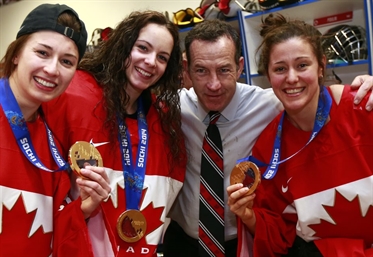Dineen delivers
Dineen delivers
Canada's coach reflects on changing fortunes

 Canadian coach Kevin Dineen celebrates with Genevieve Lacasse, Shannon Szabados and Charline Labonte after his team's gold medal win against the United States. Photo: Jeff Vinnick / HHOF-IIHF Images
Canadian coach Kevin Dineen celebrates with Genevieve Lacasse, Shannon Szabados and Charline Labonte after his team's gold medal win against the United States. Photo: Jeff Vinnick / HHOF-IIHF Images
From Florida failure to Olympic gold, Kevin Dineen has experienced a roller-coaster ride in the 2013/2014 season.
The rugged right-winger, veteran of more than 1,000 NHL games, was only appointed to his current job behind the bench of Canada’s women’s team with two months to go before the Olympics. He got the call while on a fishing trip in southern Florida, recovering from the news of his dismissal from the Panthers after a 3-9-4 record early in the NHL season.
Dineen quickly accepted the bait of extending the women’s Olympic gold rush and ultimately hooked the biggest catch in the game in thrilling style with an overtime victory over arch-rivals USA on Thursday evening.
It’s been an unlikely journey to glory for a man whose previous Olympic experience was back in 1984 as a player in Sarajevo, where he was held pointless in seven games as Canada finished fourth.
“I haven’t read the manual on where I go from from here,” Dineen reflected. “It seems like I took a left turn somewhere on the journey.
“But as I told my players, from the first day I met them I couldn’t wait to get on the ice with them. I’m a big believer that if you have got someone with talent and, just as important, with the right character, then special things can happen.”
Defeated U.S. coach Katey Stone instantly quipped: “I think you took a right turn.”
Dineen's personal journey from failure to triumph was mirrored by his team's recovery in the final, scoring twice in the last four minutes to force overtime, then weathering a U.S. storm before snatching victory.
Continue readingBut not all of Dineen’s early calls met with unanimous applause and the decision to strip long-serving Hayley Wickenheiser of the captaincy was a tough moment for all concerned.
“Coaching is all about making hard decisions for the team,” he explained. “That decision had a real sting for Hayley, but when you have transparency, when you can explain what you think is best for the team it might not make it easier but she gets it. That’s why she’s a special player and a special person.”
Team Canada has also worked hard to get in shape for the Olympic campaign, even before Dineen’s arrival. At times it seemed the demands might be too tough, especially as the U.S. – always the major rival for the big prize – picked up a series of morale-boosting wins against the old enemy in the run-up to the Games. In the end, though, a perfect campaign saw Canada see off all-comers, including two 3-2 wins over the U.S. to land its fourth gold medal.
“For the last eight months we’ve beaten this team to death,” he said. “We really exhausted them, put them into situations where they would be at a disadvantage.”
That intense schedule paid dividends in the final as Canada recovered a two-goal deficit in the last minutes before snatching a dramatic overtime winner thanks to Marie-Philip Poulin’s second of the game.
“It’s been a really easy job to coach this team because of the veteran leadership in our squad,” Dineen added. “They never say die, they push hard and they really earned that second goal. It’s a great feeling for me, and even more so for them.”
Many who watched the gold medal game at Sochi’s Boshoy Ice Dome rated it among the finest games women’s hockey has ever seen, and it came at the end of a tournament which saw more competitive games, far fewer blow-outs and a clutch of European players breaking the traditional North American stranglehold on the MVP and tournament all-star teams. All of which is great news for women’s hockey as a product, but raises further questions about the future of a sport where too many players drop out at the end of their college years for want of opportunities to play professionally.
It’s been a recurring theme in the competition, with the debate about the future of the women’s game fuelled by issues such as the retirement of Finland’s goalie Noora Raty and the threat to the state funding enjoyed by Germany’s national team.
Dineen, as a relatively new recruit to the women’s game, believes that the future could be bright, even if it’s currently shrouded with uncertainty.
“I don’t know where we’re going with a pro league for women’s hockey,” he said. “You have to look at the product, and if you’re watching a game like the final you get a little taste and you wouldn’t mind watching some more.
“When you go into a city you’ve got a lot of competition for your entertainment dollar. You have to get a good product, do it right on the ice and entertain people. I believe we can put a pretty good event together.”
Even without reading the manual, it's a fair bet that more events like the 2014 Gold Medal Game would go beyond ‘pretty good’ for women's hockey in Canada and beyond.
Back to Overview







































